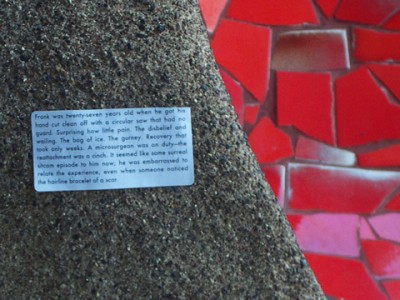Ulriken from our porch

Ulriken from our porch, originally uploaded by srett.
The sun peeked out this morning on a clear sky, revealing Bergen blanketed in winter splendor, a day after the winter solstice.

Ulriken from our porch, originally uploaded by srett.
The sun peeked out this morning on a clear sky, revealing Bergen blanketed in winter splendor, a day after the winter solstice.
The University of Bergen department of Linguistic, Literary and Aesthetic Studies will have two PhD stipends available in 2010. The stipends are awarded competitively to two of the top candidates who apply. Candidates must have completed an MA degree, have an excellent educational and research record, and have a well-developed project description. Digital Culture is one of the groups within LLE. We have a strong possibility of securing a stipend in this round should an exceptional candidate apply. Applications are accepted internationally. The pay for a PhD candidate in Norway is very good. It is treated as a research job, and pay and benefits are commensurable with many assistant professor positions in the US. I strongly encourage researchers who have completed their MAs with a strong research record in digital culture, particularly electronic literature, to apply. The application deadline is Jan 31, 2010, for three year PhD candidacies to begin in September 2010.
Late yesterday, I wrapped up my long (and very fun) day at Digital Arts and Culture 2009 in Irvine by presenting my paper “The ppg256 Series of Minimal Poetry Generators” in the late afternoon cognition and creativity panel and then by being a part of the extraordinary DAC Literary Arts Extravaganza, quickly presenting selections that I called “Five Uneasy Pieces:”
Alex Mitchell just did a great job of presenting thw work he and I did on the influence of interactive fiction platforms: “Shaping stories and building worlds on interactive fiction platforms.” We looked at how TADS 2 and Inform 6, which are really extremely similar development systems created to do almost exactly the same things, nevertheless may offer different affordances to IF authors and may influence the way story words (and other aspects of IF) are developed. Check out the full paper if this interests you.
Ian Bogost and I just gave our talk “Platform Studies: Frequently Questioned Answers” here at Digital Arts and Culture in Irvine, California. There were three other talks – fascinating ones – in this day’s opening plenary session. Garnet Hertz took us into circuit bending, tactical media, and the artistic recycling and reuse of electronic waste. Jason Farman spoke on locative media with a focus on geocaching as technologically-enabled, embodied, proprioceptive play. Conor McGarrigle explored, in detail and with reference to several specific projects, the relationship between the practices of the Situationist International and contemporary locative media work.
Among the many great presentations here at DAC 2009 at UC Irvine, the paper by Aaron Kashtan, “Because It’s Not There: Verbal Visuality and the Threat of Graphics in Interactive Fiction,” was particularly nice to hear. Aaron discussed my 2000 interactive fiction Ad Verbum, related it to Emily Short’s City of Secrets, and presented a nice argument about how these two engage (differently) with text’s ability to represent the visual. Here’s the abstract:
Ian Bogost and I just gave a talk on platform studies at UC Irvine’s Center for Computer Games and Virtual Worlds. We talked about our book on the Atari VCS, Racing the Beam, and about the platform studies concept more generally. A nice crowd came out on the rainy Friday afternoon and engaged us in some good discussion afterwards. Although we’ve both talked about the book and platform studies in several different places, this was the first talk we’ve given together. I think it worked well, but I guess writing a book together is good preparation.
Scott Rettberg’s very verbosely named workshop The Network as a Space and Medium for Collaborative Interdisciplinary Art Practice Conference, which took place in Bergen, Norway this November 8-10, was recorded, and the recordings of the panels are now up as a series of podcasts. It was a great gathering, and I’m glad this documentation of the event is available.
From an email about a conference – the sender and the conference will remain nameless:
Please advise me if your mate will be attending the conference & whether she/he is an ‘adult’ or a ’student’
An interesting development: The magazine Game Developer recently announced the finalists for the 2009 Front Line Awards, gathering “the year’s best game-making tools in the categories of programming, art, audio, game engine, middleware, and books.”
In the book category, the finalists are:
 Nick Montfort and I are working with a designer to develop a coffee-table photo book version of Implementation, the sticker novel we published in 2004-2005. Originally, most of the photos submitted were of a resolution only suitable for the Web. We are currently looking for readers to help re-implement Implementation and to send in higher resolution photos of stickers in situ. To participate:
Nick Montfort and I are working with a designer to develop a coffee-table photo book version of Implementation, the sticker novel we published in 2004-2005. Originally, most of the photos submitted were of a resolution only suitable for the Web. We are currently looking for readers to help re-implement Implementation and to send in higher resolution photos of stickers in situ. To participate:
1) Email at implementationphotos at gmail dot com with your postal mailing address, and we will send you an installment of stickers from the novel.
2) Choose interesting places to put the stickers up in public environments and stick them there.

Richard Evans
Richard Evans, Electronic Arts
Date: Friday, December 4th
Time: 11:00am – 12:30pm
Location: Engineering 2 – 180 (Simularium)
Hosted By: Professor Marilyn Walker, Dept. of Computer Science
“People Simulations”
Richard Evans is the Senior AI Engineer for The Sims 3 at EA/Maxis, and has previously won awards for his role in developing the AI for Black & White.
In this talk, he will demo three examples of people simulations: Sims 3, Sim Philosophers (a simulation of philosophical debate), and Sim Diary (a model of text generation based on personality traits). He will focus on what these simulations have in common: a model of social understanding combined with a model of individual personality.
The Maryland Institute for Technology in the Humanities (MITH) has just announced a site showcasing the Deena Larsen Collection, which Deena gave to MITH in 2007. Early on, Deena wrote two Eastgate-published pieces, Marble Springs and Samplers, but these are only two of dozens of pieces she has developed individually and in collaboration over the years. In addition to creating e-lit for decades, she has amassed published and unpublished material from a wide range of e-lit authors along with many computers and print materials. MITH has also announced that they are now
I got word from Nitin Sawney, founder of Voices Beyond Walls (which conducts storytelling and video production workshops with youth in the West Bank) and the Boston Palestine Film Festival, of a new site that MIT has launched: Jerusalem 2050: Visions for a Place of Peace. On the site, you can register and engage with other community members about projects and prospects, and can read the project Nitin and two others have undertaken, “Media Barrios: Envisioning Jerusalem through Media Barrios and Performance Spaces.”
I’m pleased to announce that the Call for Papers for the Workshop on Procedural Content Generation in Computer Games is now available. The PC Games workshop is co-located with FDG 2010 this coming June in Monterey, California. Deadline for submissions is February 24, 2010.
From the website:
At this point, most people should know of Google Wave. Fewer have had an opportunity to start “waving,” as Google Wave is still in a “limited preview” stage. Usually, I’m not the first in line to adopt a new technology, because I always need substantial convincing for why I should bother. In the case of waving, I had a realization that many of my current communicative frustrations may be alleviated with a reorganization of how I understood conversations. Immediately, I got on Facebook and announced that I’d really really want an invite to Google Wave– I was waving in matter of minutes (Thanks Kyle!).
Tonight, Kathe Kollwitz of the Guerrilla Girls joined the variable_d salon to discuss activism in a digital age. Formed in 1985, the artists assumed the names of dead women artists and wore gorilla masks in public, concealing their identities and focusing on the issues rather than their tastes adn personalities. Between 1985 and today, over 100 women, working collectively and anonymously, have produced posters, billboards, public actions, books and other projects bring gender issues to the forefront of public debate and discussion.
Tiltfactor explores human values in games and in the game design process. Some of these values include things like sharing, loyalty, privacy, and cooperation. Often, these values are necessary for altruistic acts to occur. Looking at the evolutionary roots for altruism, however, Dr. Michael Tomasello, a developmental psychologist, studied how 18 month old children will automatically assist an adult who needs help opening a door. This behavior seems to arise earlier than most children are taught to be polite, suggesting that there is a natural inclination to help embedded within the human spirit. Read the November NY Times article, and
look at Tomasello’s book Why We Cooperate, with Carol Dweck, Joan Silk, Brian Skyrms and Elizabeth Spelke.
Belatedly, I want to mention a least a bit about the great conference that I participated in two weekends ago in New York: The Internet as Playground and Factory: A Conference on Digital Labor. The gathering was organized by Trebor Scholz and took place at the Eugene Lang College for Liberal Arts at the New School.
Thriller:
Smooth Criminal:
Something to give thanks for and dance your way into turkey comas. Happy Thanksgiving!
On Monday (November 30) at 6pm in MIT’s room 14E-310,
The Purple Blurb series of readings and presentations on digital writing will present a talk by

Marina Bers
associate professor at the Eliot-Pearson Department of Child Development and adjunct associate professor in the Computer Science Department at Tufts University.
That’s an interview with Alan DeNiro now up at Grinding to Valhalla. DeNiro is author of the just-published Total Oblivion, More or Less, in which Minnesota, and then the rest of the US, is invaded by ancient European tribes. DeNiro also wrote and programmed one of the most unusual interactive fiction pieces of recent vintage, Deadline Enchanter. Or perhaps the word is “bizarre.” The game seem to not completely work, in a few different senses of “work,” but I was intrigued with it and found it to be oddly compelling, a refreshing experiment. Hopefully novel-readers will receive a similar wake-up slap from Total Oblivion, and, hopefully DeNiro won’t abandon interactive fiction now that he’s made it to print.
Powered by WordPress